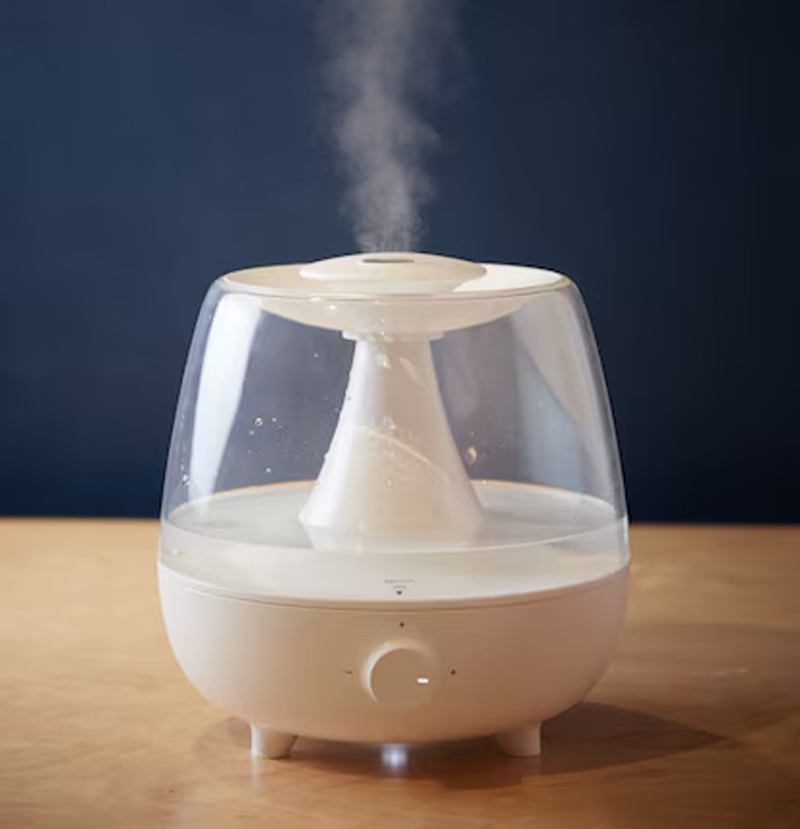
Have you ever noticed your nose turning dry after battling through a cold? This discomfort can persist even after other symptoms have subsided, leaving you feeling parched and irritated. Not only this, it can lead to other problems, such as pain, nose bleeding, and nasal congestion. In this article, we list effective home remedies that can help you manage a dry nose after a cold.
Table of Content:-
Home Remedies To Recover From Dry Nose After Cold

Humidify Your Environment
Did you know dry indoor air can exacerbate your nasal dryness? Hence, you should use a humidifier in your home to add moisture to the air. Opt for a cool-mist humidifier, especially if you have children or pets, to avoid the risk of burns.
Saline Nasal Spray
A saline nasal spray is a simple yet effective remedy for dry nasal passages. The saline solution helps to moisturise the nasal lining and flush out irritants. You can purchase saline nasal sprays at most pharmacies, or you can make your own by mixing salt and water. Simply spray the solution into each nostril several times a day for relief.

Steam Inhalation
You can also get instant relief for a dry nose with the help of steam inhalation. Start by boiling water in a pot, then carefully lean over the pot with a towel draped over your head to trap the steam. Breathe deeply for several minutes, allowing the steam to moisturise your nasal passages. Also, it can help you alleviate the discomfort and swelling resulting from inflammation in the throat tissues. as stated in a 2017 study.
Also Read: Lingering Cough After A Cold? Expert Explains Reasons For Coughing And What You Can Do About It
Nasal Irrigation
Nasal irrigation, also known as a nasal rinse or nasal douche, involves flushing out the nasal passages with a saline solution. This can help to remove excess mucus and hydrate the nasal lining. You can use a squeeze bottle or a neti pot to perform nasal irrigation. Make sure to use distilled or sterilised water to prevent bacteria from entering your nasal passages.
Nasal Moisturising Gel
Nasal moisturising gels are specially formulated to soothe and hydrate dry nasal passages. These gels provide long-lasting relief and can be applied directly to the inside of the nostrils. Look for a gel that contains ingredients like aloe vera or glycerin, which help to lock in moisture.

Hydration
Do not forget to drink water as it is important to maintain moisture levels in your body, including your nasal passages. Therefore, drink plenty of water throughout the day to help prevent dryness. If you are bored of drinking normal water, you can even consume hydrating foods like fruits and vegetables to increase your hydration levels.
Also Read: Chills Vs Common Cold: Expert Explains The Difference Between The Two
Avoid Irritants
Certain environmental factors can exacerbate nasal dryness. Hence, try avoiding exposure to cigarette smoke, harsh chemicals, and other irritants that can dry out your nasal passages. If you're prone to allergies, try to minimise your exposure to allergens that can trigger symptoms.
Warm Compress
Applying a warm compress to your nose can help to relieve dryness and discomfort. Soak a clean washcloth in warm water, then wring out the excess moisture. Place the warm compress over your nose for several minutes, allowing the heat to penetrate and moisturise your nasal passages.
Limit Decongestants
While decongestants can provide temporary relief from nasal congestion, they can also contribute to dryness in the nose. If you're using decongestant nasal sprays or medications, try to use them sparingly and for short periods to avoid exacerbating dryness.
Consult a Doctor
If your dry nose persists despite trying home remedies, or if you experience other concerning symptoms, such as nosebleeds or persistent pain, it's essential to consult a doctor. They can help determine the underlying cause of your nasal dryness and recommend appropriate treatment.
[Disclaimer: This article contains information for informational purposes only, hence we advise you to consult your expert if you are dealing with any health conditions.]
Also watch this video
How we keep this article up to date:
We work with experts and keep a close eye on the latest in health and wellness. Whenever there is a new research or helpful information, we update our articles with accurate and useful advice.
Current Version